Misinformation about Middle Eastern food is rampant. Categorizing dishes by geography or language group seems as silly as placing French and German in the same category, or Australian, Indian, British and American food in the same category since English is our common language.
And quite frankly, even the people who live in Middle Eastern countries have a tendency to argue about who makes the dish better or about the origins of the dishes. Go ahead. Ask an Egyptian, Palestinian or an Israeli where the falafel originated. Then stand back.
What is true is these dishes manifest themselves differently throughout the Middle East. The falafel in Egypt, for example, is made with fava beans. In Palestine, Israel and Lebanon, chick peas are used. While the names remain the same, the recipes vary.
Three months ago, the Middle Eastern Deli on Independence Boulevard was bought and became Carolina Kebap: Turkish and Mediterranean Cuisine. (I know the letter "P" looks strange; Arabic does not have the letter "P," but Turkish does). However, the exterior signage has not changed and only a temporary "Under new management" sign has been added. Curious.
Rasim Ozbay, a native of Turkey, is the new owner. The story he tells is that he met Atef Shouf, the longtime owner of the Middle Eastern Deli, in Dubai and bought the business from him sight unseen. Ozbay had been living in Dubai, where he owned a shipping company which he says had been hurt by the global recession. He opened his place last February.
The interior of the restaurant has been spiffed up a bit. The refrigeration cases are gone and the dining area enlarged. A new soffit, chandeliers and lighting pendants add some style to the room. But much is still the same -- except the menu, which is now mainly Turkish.
What is Turkish cuisine? Mediterranean? European? Middle Eastern? The country fits all these descriptions, and the food does as well. Integral to Turkish cuisine are rice, wheat, lemons, olive oil, cheese, fish and, of course, kebabs. These are sish, the grilled pieces of skewered meat; or döner, vertically stacked meat, similar to gyro, grilled over a slow fire. Unfortunately, Americans have been exposed to the nasty, processed, pressed meat cones served at gyro shops across the country. When you use the same word to describe a dish, confusion follows. Using the same descriptor, gyro, to describe both processed meat cones and stacks of thinly layered slices of meat is puzzling and akin to comparing Carolina barbecue to a McRib. No one in the Carolinas would make that mistake.
True Greek gyros are layers of stacked meat (pork, chicken or lamb) -- not ground meat -- pressed tightly together and grilled vertically. Gyro shops in Greece, shawarma shops in Lebanon, and Mexican taquerias serving tacos al pastor (grilled pork on a tortilla) all have the same concept of vertically grilled meats with a variation of spices and, perhaps, a sauce. Within a single culture, these wraps vary. In Greece, northern gyros are slathered with a mustard-based sauce; in Athens, tzatziki sauce is preferred, while in Crete, aïoli sauce is used.
Carolina Kebap only serves Turkish-styled vertically grilled meat (not the processed kind) döners on Fridays and the meat varies without a prescribed schedule. All meat is halal. On one Friday, I had the chicken döner, but was disappointed. Beyond the chicken, flavor was absent. Was I comparing it to a densely flavored shawarma, or charred al pastor, or the mustard-laden gyros? Yes. This döner paled in comparison. In fact, much of the Turkish food at Carolina Kebap is missing flavor. The grape leaves are perfunctory. The carrot salad is mechanical. One exception to this is the tomato salad, acili ezme, which is punched up with cayenne and sumac. The ground lamb wrap was the only sandwich to pass muster. The grilled lamb was overcooked, and the chicken wrap plain.
But some of the appetizers are worthy of a go. The sigara boregi, or cigarette börek, is thinly rolled phyllo filled with a melted farmer cheese while the kiymali börek has ground beef encased in delicate layers of phyllo. On the front counter are trays of shortbread cookies dusted with powdered sugar. These, too, were good.
When the Middle Eastern Deli changed hands, the cuisine changed as well. Although Ozbay told me rather emphatically that Lebanese cuisine comes from the Turks during their centuries-long occupation of that country, each country in the former Ottoman Empire -- including Greece and Lebanon -- made sweeping changes to similar dishes. Foods from the Middle East may have the same names, but the taste is radically different. But you've got to hand it to people who are so passionate about their cuisines that they are willing to get into an argument over it.
Know of a restaurant that has opened, closed, or should be reviewed? Does your restaurant or shop have news, menu changes, and new additions to staff or building, upcoming cuisine or wine events? To be included in our online blog, Eat My Charlotte, send information to Tricia via e-mail (no attachments, please): tricia.childress@creativeloafing.com.
Carolina Kebap: Turkish and Mediterranean Cuisine, 4508 E. Independence Blvd. 704-568-7781. Hours: Monday through Thursday, 11 a.m. to 9 p.m.; Friday and Saturday, 11 a.m. until 10 p.m.; Sunday, 11 a.m. until 6 p.m.
Speaking of...
-
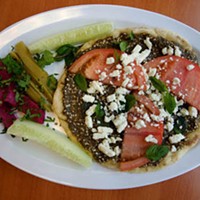
Best Middle Eastern
Oct 3, 2012 -
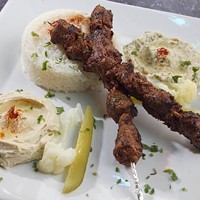
The gift horse: Troy's Mediterranean Grill
Dec 13, 2011 -

Cooking class: Mediterranean Christmas Classics
Dec 1, 2011 - More »
Latest in Reviews
More by Tricia Childress
-
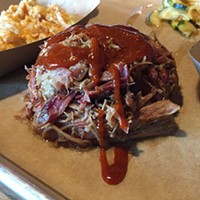
Seoul Food Meat Co's got soul
May 4, 2016 -
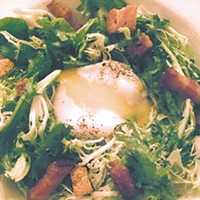
Aix en Provence flourishes in Myers Park
Apr 6, 2016 -
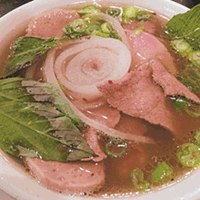
Pho and beyond at Saigon Bay Vietnamese Cuisine
Mar 2, 2016 - More »
Calendar
-

Charlotte Wine & Food Week’s Annual Sake Dinner at Mizu @ Mizu
-

Hands On Cocktail Class Featuring Gin at DTR Southpark @ DTR SouthPark
-

Angeline’s Featuring Sciandri Family Vineyards @ Angeline's
-

Aria Tuscan Grill Featuring Allegrini - Charlotte Wine + Food Week @ Aria Tuscan Grill
-

Charlotte Wine + Food Week Presented by Truist @ Charlotte, NC
-
Recipe: Ice Cream Sundae Cupcakes 6
These Ice Cream Sundae Cupcakes are filled with chocolate ganache and topped with vanilla buttercream.
-
Back of the Box: No Boil Classic Lasagne 5
Not having to boil the noodles rocks!
-
Authentic & Delicious Indian Restaurant Botiwalla NOW OPEN in Optimist Hall! 2








